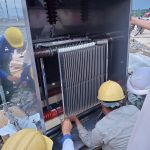



SPECIFICATIONS
Indoor/Outdoor installation
Up to 40kV
100 to 1200 A (Low Resistance)
Up to 25A (High Resistance)
Duty 10s / 30s / 60s or continuous
50 Hz / 60 Hz
IEEE Std C57.32:2015
AN, AF Cooling
Neutral Grounding Resistor
Protect Your System - Reduce Downtime

Neutral Grounding Resistors play a crucial role in mitigating issues arising from transient over-voltages and arcing ground faults in electrical systems. These problems include insulation breakdown and potential damage to motors and switchgear. The two main methods of system neutral grounding: Low Resistance and High Resistance.
- Low Resistance Method
In the Low Resistance method, the system automatically trips in the event of a line-to-ground fault. A Neutral Grounding Resistor is employed to limit the ground fault to a range of 100 to 1000 A, with detection facilitated by Zero-sequence Current Transformers and Ground Fault Relays. These devices trigger at 5 to 20% of the maximum ground fault current. Typically rated for 10 seconds, the resistor ensures a maximum temperature rise of 760 °C. In practice, 200 to 400 A rated Neutral Grounding Resistors are used in 6.9 kV to 38.5 kV systems, while 100 to 400 A rated resistors find application in 2.4 to 4.16 kV systems. The ohmic value of the resistor is determined by dividing the Line to Neutral Voltage by the Current Rating.
- High Resistance Method
Contrastingly, the High Resistance method issues an alarm but does not trip the system in the case of a Line-to-Ground fault. This method is suitable for systems where power interruption due to a single fault is detrimental to the process. The Neutral Grounding Resistor limits the ground fault to 5 to 10 A, with detection by Zero-sequence Current Transformers and Ground Fault Relays triggering at 10 to 20% of the maximum ground fault current. Rated for continuous duty, the resistor maintains a maximum temperature rise of 375 °C. The maximum ground fault current allowed must exceed the total capacitance to ground charging current, and the vector sum of the system charging current plus the resistor current shall not exceed 8 A. The ohmic value is calculated as in the Low Resistance method.
Some pictures of installed Neutral grounding resistors in Vietnam
Certification and Performance confirmation for PowerMore





